#New Art Dealers Miami
Text

CANDACE THATCHER
NADA MIAMI 2023
The Landing Gallery
Booth C.305
Tuesday December 5th -
Saturday December 9th
Archive Scan XVI, 2022
Acrylic on wood panel
36" x 36"
(CTHA-0009)
#candace thatcher#candacethatcher#painting#artists on tumblr#p5js#artistsontumblr#foryourprocessing#New Art Dealers Miami#miami art week#nada
2 notes
·
View notes
Text
Before I Knew [Jake Seresin x Reader]
Chapter One

A Jake Seresin unexpected pregnancy fic
Overview: On your first night after moving to San Diego to spend more time with your brother Bob, you unknowingly have a one night stand with his teammate Jake Seresin. For the first time in his whole life, Bob has a closely knit friend group and you’re desperate not to rock the boat. But an unexpected and unplanned pregnancy upends your world, forcing you and Jake closer together, against Bob’s wishes. What will happen when you find yourself actually falling for the father of your unborn child?
Pairing: Jake Seresin x Reader; Bob Floyd x Sister!Reader
Warnings: Pregnancy, cursing, eventual smut, alcohol
Chapter summary: Y/N meets Bob's squadron, and encounters someone she thought she'd never see again; the Daggers celebrate Jake's birthday where he and Y/N have their first conversation after the one night stand
Masterlist here
You were late. Bob was going to kill you. Your brother was a stickler when it came to being on time. It came as no surprise to anyone in your family that he had gone into the military.
You rushed through the door, purse strap getting caught on the handle and you tugged it free, chest rising as you spun around, searching for Bob. He stood in the corner of the coffee shop, pristine in a khaki uniform, eyes wide behind his wire glasses.
“Hi Ducky,” he said as you tossed yourself into his arms, breathing in his familiar scent. He felt like home, even though it had been years since you and Bob had lived under the same roof. You had been barely a teen when Bob left for the Naval Academy, and his stints on land were far and few between after. His assignment to Top Gun was the first time he had settled somewhere on a more permanent basis. It’s why you decided to move to San Diego after college. All of your friends had scattered around the country – grad school in New York, policy analysts in Washington, even one friend had taken an internship with an art dealer in Miami. But you had packed up and left Tennessee with one goal. Be closer to your brother.
“Bobby,” you grinned, stepping back to admire him. Every time you saw him it was months apart and so much had changed, but also so little. He was the same Bob who had thrown you over his shoulder to win the family flag football game on Thanksgiving. The same Bob who had carried your book bag for you when you were in elementary school and he was a middle schooler and went a mile out of his way every morning to make sure you got to your homeroom class safe and sound. The Bob who always picked up, day or night, when you called. The Bob who listened to you weep about your college boyfriend who broke your heart. The Bob who took care of you when you were seven and had the flu and your mom was working a double shift at the hospital and couldn’t stay home with you.
“Ducky,” he said, dropping your hands. The familiar nickname on his tongue brought forward a flood of memories: spring weekends flying kites in the nearby park, sitting on the back of a tandem bike with Bob on a trip to Florida to visit your grandparents, the fort the two of you made the one time it snowed two feet in Tennessee in under a day in March. “This is my squad. Guys, meet my sister, Y/N.”
You tore your gaze from Bob, looking over at the table he was gesturing to, a smile plastered on your face. A beautiful brunette with pearly white teeth and a tight bun was on the far left. That was Phoenix. You had received a handful of letters from Bob talking about her. Next to Phoenix was a handsome, bulky man with a mustache in a plain blue t-shirt. Wow, he was gorgeous.
Your eyes shifted over one more, breath halting in your throat as your gaze slowly crept up. First you spotted the dog tags. Eerily familiar, but then again, a lot of military guys wore dog tags, right?
Then the chin. Ridiculously cut jaw, slight bifurcated butt chin that you had found weirdly adorable two nights before. Plump, pink lips, puckered up in a grin. You felt your heart sink. There was only one thing left. You raised your eyes to his. Clear, seafoam green. An ocean in two small orbs. He smiled as you screamed internally.
Bob’s voice drew you out of your coma. “That’s Bradley.” The mustache man waved a hand. “And Jake Seresin. Hangman.”
Jake. Your stomach did a somersault.
Last time you had seen him, you had been teetering on the edge of drunk, standing outside of the bar with one hand on the railing, the salty ocean wind licking at the sweat on your collarbone, flicking the ends of your hair up against your chin.
The next moment, his tongue was on your throat, in your mouth, fingers in your hair, pressing your body against the railing of the deck as you whimpered into his lips.
You had crept out of bed before he woke up. Just a gorgeous, tan, muscular back sticking out beneath crisp white sheets as you tugged on your short dress and called an Uber. You had expected to never see him again.
And here he was, smirking at you as your brother’s gaze narrowed.
You had fucked up. Correction. You had fucked Jake Seresin. And that was a major fuck up.
***
Bob had never been the type to have a huge friend group, or any close friends really. So the first time he called from Top Gun, giddy with excitement, you had been elated for him. Your brother deserved a tightly knit friend group.
Before you had moved to San Diego, Bob had filled you in on the group’s antics. Their flights, their wild nights out, the dynamics. But he had centered mostly on Phoenix and Rooster.
Jake had conveniently been left out of the majority of the conversation.
“Well?” Bob asked as the two of you headed back to his house in your rental car. “What do you think of the group?”
“They’re nice,” you said.
“That’s it? Nice?”
You sighed. “I’m really happy for you, Bobby. You have a good group of friends. I know that’s what you always wanted.”
Bob leaned back against the seat. You were the one person that Bob confided in. He was an open book and you could read him with one glance. Looking over, you spotted his furrowed brow, the tense way he was squeezing his knuckles together.
“Are you OK?” you asked, turning your eyes back toward the road, slowing down to take a right turn.
“Tell me you didn’t move here for me.”
“Then I’d be lying.”
“Y/N,” Bob said. His voice had taken on Big Brother™ mode. “You shouldn’t have done that.”
“Don’t you want me around?” you whispered.
“Of course I do,” Bob replied. “I just don’t want you to waste your life following me.”
“Living in California a waste?” you asked. “No way.”
“What’s the plan, Duck?”
“Not everyone was born potty trained and with a plan, Bobby.”
“You’re twenty-three,” he countered. “It’s time to be an adult and figure out what you’re doing with your life.”
“You sound like mom.”
“And we both know she’s never wrong.”
You sighed. “Just because you got your life together at seven doesn’t mean I have to.”
“Duck—”
You cut him off. “Bobby, please. It’s been a week. Give me a little time and I promise, I'll figure out what I’m doing. Just be my brother, OK, instead of acting like my dad.”
That silenced him. Bob had taken your father’s disappearance harder than you had. He put on a brave face. He stepped up. He became the man of the house. But that meant that he had taken it upon himself to be your brother and your dad. So even at twenty three he still saw you as a child.
The two of you drove the rest of the way back to Bob’s house in silence. Inside, you were just about to close the door to your guest bedroom when Bob’s voice floated down the hall.
“By the way,” he said, “I told the squad we’d go out for drinks with them tonight. It’s Jake’s birthday.”
You grimaced. “Sounds good.”
“Leave at nine?”
“Sure.” You closed the door, plopping down on the bed face first. You had moved to San Diego to figure your life out. And of course the first thing you had done was have a one night stand with one of Bob’s teammates. If he had been anyone else in the world you would have been able to avoid him.
What do you get someone for their birthday when you hoped you’d never see them again?
***
“Floyd!”
You turned at the same time as Bob. Bradley grinned. “Oh this is going to get confusing.”
“Here.” Natasha pointed to the bar stool next to her. “Have a seat. Boys will get you a drink. Bradshaw?”
Bradley tipped his head. “On it, ma’am.”
She rolled her eyes as you settled into the seat, crossing your legs beneath the short skirt. “So, Y/N. Bob’s told me all about his little sister. But he left out that you were coming to live here.”
“I’m not much of a planner.”
Phoenix laughed. “The anti-Bob. I like you already.”
“He’s told me a lot about you,” you replied. “And Bradley.”
“And nothing about Jake I’m guessing?” You nodded and Phoenix took a sip of her beer. “Trust me when I say, you don’t want to even go there.”
“Are you speaking from experience?”
Phoenix craned her neck around, making sure the two of you were out of earshot before nodding. “Just steer clear of him. That’s my suggestion. Hangman is fun for a night. But things get messy quick. And he and Bob have a little bit of a history.”
You frowned. “What kind of history?”
Just as Phoenix opened her mouth to respond, Bradley pressed a beer into your open hand. “Ducky.”
You grimaced. “Bobby, you didn’t!”
He shrugged. “Sorry.”
You rolled your eyes. “I’m so going to eat your last Pop-Tart tomorrow just to get you back for that.”
“Fill us in, will you?” Phoenix asked.
“When she was four, Y/N became obsessed with those little yellow rubber ducks that you put in your bath.” You groaned as your brother recounted the full story. How you had thrown a fit when your mother had tried to take you out of the bath and the only thing to calm you had been to fill your bed with the rubber ducks. And how the next morning that continued, one rubber duck gripped firmly in your chubby hand as you ate breakfast, went to the park, tagged along to the grocery store, went to daycare. This continued for weeks.
You didn’t want to admit to the team that you still had a rubber duck stuffed inside your suitcase back at Bob’s house. It was a safety net of sorts.
“Sorry, Duck,” Bob said, squeezing your shoulders and placing a small peck on the top of your head.
You looked up at him. His cheeks were flushed, he had a massive grin on his face. He was happy. All you had wanted in as long as you could remember was for Bob to be happy. He took your happiness more seriously than his own. It was time you returned the favor.
“Am I interrupting?” All eyes turned to Jake. He had on a tight black t-shirt and a pair of jeans with cowboy boots peeking out the bottom. He shot a grin your way and you did your best to avoid his eye contact.
“Happy birthday, Hangman.” There was a chill in Bob’s voice, or perhaps you were reading into it because of what Phoenix had said earlier.
Jake nodded. “Thanks, man. Anyone up for a game of darts?”
Bob dropped his hand from your shoulder, following Phoenix and Jake back toward the darts board on one end of the bar. You sat back in your seat, tipping the beer down your throat, watching as they played. There was an easy banter with all of them.
You finished your beer, the darts game still ongoing. Quietly, you slipped around the edge of the room, out the door that led to the back deck.
It was quiet outside, just the sound of the waves crashing against the hard sand and the soft hum of the music as it seeped through under the door and from behind the old windows. You laid your fingertips on the wooden railing, tipping your head back toward the moon that was slung low in the sky, feeling the cool breeze dry the sweat that had started to form on the base of your neck.
“Mind if I join?”
You turned. Jake stepped out onto the deck, a beer in one hand. He approached the railing, putting the green bottle down and smirking over at you. This time you were far less drunk. You shrugged. “It’s your birthday. Who am I to say what you can or can’t do?”
He frowned. “Don’t be like that.”
“Just because you’ve seen me naked doesn’t mean you know me.”
He looked bristled. “Y/N. I had no idea you were Bob’s sister when we met the other night. If I had known, I—”
“Wouldn’t have fucked me?”
He grimaced. “You’re the one that left without saying anything.”
You folded your arms over your chest. “It’s not like you were falling over yourself to drive me home. It was better that way and we both know it.” You allowed yourself to look up. God, he was stunning. Green, wide eyes. Tanned skin, the way his forearm flexed as he gripped the railing. You could remember the way his touch felt as he dragged his fingertips over your skin. You tried to shake the memory from your mind. “Just do me one favor.”
“Sure.”
“Don’t tell Bob,” you whispered. “Let’s just forget the other night ever happened.”
Jake’s gaze lingered. “If that’s what you want.”
You pushed up off of the railing. “It’ll be better, trust me.” You headed for the door, turning around at the last moment. Jake was still leaning against the railing, watching the waves in the dark. “Jake?”
He turned, green eyes wide. There was something almost sad about him, you thought. It was a fleeting glimpse, but you saw it.
“Happy birthday.”
He smiled. You turned, peering through the glass on the wood door. Bob had his head thrown back in a laugh as Bradley pounded against the piano keys and Phoenix danced. You smiled. Your brother was happy.
You weren’t going to ruin his perfectly crafted life by saying you had slept with one of his friends. It would be easier for everyone if you and Jake Seresin pretended you had never met before.
How would they ever catch you in your lie?
Please follow my library page @ereardonlibrary as that will largely serve as my tag list. Anyone I previous promised to tag is here:
@bobfloydsbabe @blue-aconite @wkndwlff @mamachasesmayhem @mandylove1000 @djs8891 @clancycucumber230 @rosiahills22 @buckysteveloki-me
@kmc1989 @gigisimsonmars @eloquentdreamer @mjisbby @shanimallina87 @seresinslady @seresinhangmanjake @blackwidownat2814 @yanna-banana @bbyvanessaa @mrsjobarnes @midnightmagpiemama @ingoaliesitrust @rockbottomphilosophies-blog @iangiemae @joaquinwhorres @boiolay @sometimesanalice @spinning-away
#jake hangman fic#top gun fanfiction#jake seresin#top gun imagine#bob floyd fanfiction#jake hangman x you#hangman fanfiction#jake hangman imagine#bob floyd x female reader#robert bob floyd x reader#bob floyd x y/n#bob floyd x reader#jake seresin x y/n#jake seresin x you#jake seresin x reader#pregnancy#pregnancy fic#unexpected pregnancy#sister reader#natasha phoenix trace#bradley bradshaw#bradley bradshaw x reader#glen powell
456 notes
·
View notes
Text
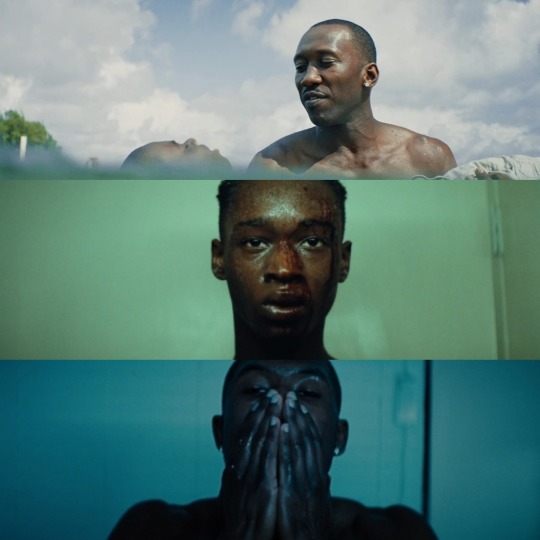
Moonlight (2016, Barry Jenkins)
14/11/2023
Moonlight is a 2016 film written and directed by Barry Jenkins, based on the play In Moonlight Black Boys Look Blue by Tarell Alvin McCraney.
The film was positively criticized and won numerous awards, including the Best Film Award from the National Society of Film Critics, the Golden Globe for Best Drama and three Oscars for Best supporting actor, for best non-original screenplay and for best film: it is the first LGBT-themed film to obtain this recognition (after Philadelphia), as well as the first with a cast entirely made up of African Americans, and the second for the highest grossing low (behind The Hurt Locker which won in 2010).
Chiron is an African-American child originally from Liberty City, called "Little" by everyone. He and his mother live together in a Miami neighborhood marked by drugs and violence.
As an adult Chiron becomes a drug dealer in a bad neighborhood of Atlanta and there he tries to live on his own, armed with his faithful revolver.
In 2003, Tarell Alvin McCraney wrote a semi-autobiographical play, In Moonlight Black Boys Look Blue, partly to deal with the death of his AIDS-stricken mother.
After the release of his first film, Medicine for Melancholy in 2008, Barry Jenkins wrote several screenplays, none of which went into production. He and producer Romanski began brainstorming sessions via video chat twice a month about his projects, and shortly thereafter Jenkins began work on the script for McCraney, which he learned about through Borscht's Miami arts collective. After consulting with McCraney, Jenkins wrote the first draft of the film during a month-long stay in Brussels.
Jenkins sought financing for the film throughout 2013, finding success after sharing the script with Plan B Entertainment executives at that year's Telluride Film Festival. Dede Gardner and Jeremy Kleiner became producers of the film, while A24 undertook to finance it and handle worldwide distribution, which also marked the company's first production.
The film had its world premiere at the Telluride Film Festival and subsequently at the Toronto International Film Festival on September 10, and at the New York Film Festival in October.
The film was chosen as the opening film of the 2016 Rome Film Festival. Its first television appearance took place on 4 March 2018 on Sky Cinema with the title Moonlight - Tre storie di una vita.
On the aggregator Rotten Tomatoes the film receives 98% of positive professional reviews with an average rating of 9.00 out of 10 based on 384 critics, while on Metacritic it obtains a score of 99 out of 100 based on 53 criticism.
#moonlight#2016#barry jenkins#Tarell Alvin McCraney#National Society of Film Critics#Golden Globe Award for Best Motion Picture Drama#academy awards#Academy Award for Best Supporting Actor#Academy Award for Best Adapted Screenplay#Academy Award for Best Picture#philadelphia#african americans#The Hurt Locker#82nd Academy Awards#liberty city#miami#atlanta#hiv aids#Medicine for Melancholy#brainstorming#Brussels metropolitan area#Plan B Entertainment#telluride film festival#Dede Gardner#Jeremy Kleiner#a24#toronto international film festival#New York Film Festival#sky cinema#rotten tomatoes
5 notes
·
View notes
Text

interview. | timeline. | wanted. | pinterest. | navi.
name: carmen rivera
card: the chariot
birthday: october 1986 (36 - scorpio!)
birthplace: miami, florida
current residence: brooklyn, new york
gender: cis woman // she/her
occupation: art dealer
face: summer bishil
character inspo: robin buckley (s3 only! of stranger things), jonathan byers (stranger things), love quinn (you), katherine pierce (tvd), cady heron (mean girls), margaery tyrell (game of thrones), beth harmon (queen's gambit), audrey hope (gossip girl hbo).
from the mun: hi guys! I go by jess, and I’m really excited to be here! this is my first group in a year, and in that time tumblr decided to fuck around with its whole ass interface so (upside smiley), we're on a learning curve rn with that. but otherwise, I’m still really excited to be here and to plot! I’ll post a plot call on discord later, but also wanted to state one here that if you’re up for plotting and wanna plot with my girl, feel free to give this a like and I’ll hit you up! (:
growing up.
born in miami, florida to her single mother, leticia "lettie" rivera. they were a very happy family, if not at all rich or stable. lettie was a young single mom who had a penchant for two things: moving, and falling in love. as such, throughout carmen's childhood, the riveras never stayed in one place for more than two years.
as a child, carmen didn't mind because lettie did a wonderful job of depicting their travels as "chasing adventures," romancing their travels as a grand roadtrip the two were embarking on as they traveled across the nation. in reality, they moved because lettie faced one two many heartbreaks, not enough heartbreaks, or she heard of a betty paying job somewhere else.
a key way that lettie romanced their situation was through art. art could be found anywhere, created by anyone (*cough* it was a free medium! *cough*) and was a perfect form of self-expression and a great source of entertainment. as such, lettie and carmen bonded over all the different art they came across in every city they went (very much like gilmore girls' lorelai & rory's shared love of film)
all good things must come to an end, however, and carmen was disillusioned by their way of life after lettie got involved with a rich man and carmen was placed in a rich school for a year, full of rich, snobby kids who had nothing nice to say about carmen or her mother, and were quick to point out everything weird and different about their way of life. disillusioned, she couldn't help but begin to see the faults as well. slowly, she recognized that she was going to end up just like her mother if she didn't stop idolizing her and start taking shit more seriously, and so carmen's behavior shifted.
with a new determination, carmen made it a goal to not end up like her mother. that goal had two major objectives: a college degree and a good career. as her family continued to move from place to place, carmen stopped prioritizing making friends and relationships, and instead put her effort into making better grades and saving money. her breezy, mirthful personality morphed as she got older, giving way to a snarky, aloof demeanor.
carmen convinced lettie to settle for her last two years of high school, so in the summer of 2003, the riveras came and stayed in angelwoods. carmen ended up staying for college just because it was the most convenient option for her. lettie left town soon after carmen moved into her dorm.
oh and during high school school she worked two part time jobs - nights at the movie theater during the week, and the day shift at the local community rec center.
so!! small town reputation before college: say hello to the floozy mother and her unapproachable daughter everyone!!
college.
if carmen tried to keep to herself in high school, she did the exact opposite in college. she was an art history major with intentions to be an art dealer
that meant she needed connections baby!
anyone from a financially well-off family, with an interest in art/a family who had an interest in art, or on a clear financially successful path themselves were all people carmen very much got to know during college.
listen, is she a gold digger? no. more like gold detector. her future career depended on having a network of people to invest in future galleries or buy future art pieces from her future clients. it depended on her getting her foot in the door by getting jobs in galleries and being invited to galas and curator events. that can't happen if all her friends are poor like her!!
anyways, college was a pivotal time for her because in pursuit of fostering good connections, getting invites, and getting job opportunities, carmen found out she was not as.... morally righteous? as she thought she was
aka she screwed people over (literally and figuratively) to get to where she is today
and tbh, outside of a few ruined relationships here and there, it was all pretty worth it because she did develop a lot of good connections in college, leading to her getting a job at an up-and-coming gallery in denver out of college.
but like, oof, the personal cost to do that. not great, not great.
but that's not really an issue because she's off to denver so she doesn't have to think about any of that! you do what you gotta do to get where you wanna be, babes!
oh also, she worked as an RA (a bad one lol she only did it for the free housing) and at the university art gallery during college.
so let's talk small town college reputation: to the general public, there were RUMORS because omg it was probably so weird to see her switch up from being like antisocial poor new girl in high school to suddenly showing up to like kinda-definitely-out-of-her-class events, schmoozing and speaking more than she ever did before.
post college.
so she goes to denver! spends a year at the gallery and it's great, but she ends up moving to chicago after getting a better job opportunity there.
spends 6 years in the art world in chicago, builds an increasingly bigger and better network of artists and buyers, gains more skill working at different galleries and with different private buyers, curates a couple shows herself even before she's off again in 2015, this time to the big big leagues: nyc!
in a couple years, she was able to secure herself a very nice, financially stable job working as an art dealer for an investor conglomerate, finding pieces for their individual private collections while also working as the dealer for their well known art gallery in brooklyn. it's a cushy position, better than anything she's had in her previous years, and she's feeling really good about where she's ended up.
and of course it's then that she gets the invitation for her college reunion and is like - well shit.
personality.
positive: driven, adaptable, independent, persistent, witty, ambitious, thoughtful, jaunty, passionate
negative: aloof, selfish, ruthless, desperate, fickle, snarky, impulsive, biting, disloyal
not a heartless bitch. she thinks she is, but she is not. she grew up very carefree and curious, indulging in the imaginative world her mother spun for her, and she'll always be a creative, wide-eyed girl at heart. but once she realized that indulging in that lifestyle, with her circumstances, would only lead her to an insignificant life like her mother's, she put that side of her to bed.
she is determined, but not necessarily a planner - she's not thinking twelves steps ahead with a plan a and plan b and plan c - she has one plan: succeed, and she's adapted herself however she's needed to see that plan to fruition.
an optimist turned realist.
she is creative and intelligent (street smarts more so than book), but also biting and defensive, more reactive than she'd like to be.
embodies control but craves the freedom of her youth. longs for meaningful connections but has never learned how to properly maintain long-term relationships
and that's carmen! I did not proofread so I apologize for any typos! same goes for the wanted page, which I'm about to draw your attention to now: her wanted page is updated with a lot of jumping off points for plot connections if you wanna give that a look! if you're interested in plotting, you can like this or react to the plotting call in the discord and I'll reach out to plot!
interview. | timeline. | wanted. | pinterest. | navi.
4 notes
·
View notes
Text
Stone Raids Wall Street
Once upon a time Oliver Stone was best known for his scabrous screenplays for films such as Scarface and Year of the Dragon. Then his 1986 films, Platoon and Salvador, racked up a slew of Academy Award nominations, and Platoon collected Oscars for direction, editing, sound, and Best Picture. Stone was honored not for safe, Masterpiece Theatre-type films that make Academy members feel good about themselves, but for violent, unpleasant films on subjects considered until recently to be box-office poison—Central America and Vietnam. In one short year, he has emerged as the most interesting and important director in Hollywood. Nevertheless, as no one knows better than Stone, the winds of celebrity are fickle, and when we spoke with him in August, he was anticipating a more qualified reaction to his forthcoming film, Wall Street.
Q: How did you get the idea for Wall Street?
A: The story first came to me while I was writing Scarface. Its get-rich-quick Miami mentality had certain parallels in New York, where an acquaintance of mine was making a fortune in the market. He was like some crazed coke dealer, nervously on the phone nights trading with Hong Kong and Lon- don, checking the telex, talking about enor- mous sums of money to be won or lost on a daily basis. His lifestyle was Scarface North. He had two huge Gatsby-like houses on the beach in Long Island (he couldn’t decide which one to live in), several dune buggies, cars, Jeeps, a private seaplane company, an art collection, and a townhouse in Manhattan. Then he took a giant fall; his empire came crashing down around him. He was suspended from trading; he lost millions and spent millions more in legal fees clearing his name, which he finally did. It made him a different, stronger person as a result, and it was partly this tale of seduction, corruption, loss, and redemption (as well as other stories we heard on the street, among them that of David Brown, a broker convicted for insider trading who served as an adviser on the film) that was the basis of Charlie Sheen’s character in our script.
Q: Wasn’t your father a broker?
A: Yes, he was on Wall Street for 50 years or so. My father’s world was very intimidating to me; I viewed it from an Orson Welles perspective out of The Magnificent Ambersons. | remember the staircases and mirrors. I remember looking down through banisters at Mom’s parties, at the rich people, the sophisticated people, women from Europe with accents, Belafonte or Sinatra on the phonograph singing ‘50s songs. Then they’d go out in packs like in La Dolce Vita to faraway places like El Morocco.
Dad would take me to the movies (how rare to be alone with him)—Dr. Strangelove, Paths of Glory, Seven Days in May—the ones with the ideas, and inevitably he’d come out of the movie and say, "Well, we could've done it better, Huckleberry,” and he’d tell me all the reasons why this plot was silly or illogical. It would make me think, which is one of the things a father is supposed to do. And he’d always say they never did intelligent pictures about businessmen; businessmen were always satirized or were stereotypical bad guys.
Dad believed very strongly in capitalism. Yet the irony of it all was that he never really benefited from it. All his life money was an overriding con- cern. But he never owned a single thing; every- thing was rented, right down to the cars, the apart- ments, and if it had been possible, the furniture. There was an insecurity at the heart of our family existence. I began to resent money as the criterion by which to judge all things, and there grew to be a raging battle between my father and me about it. I found ways to throw away everything I had, which pissed my father off. | went to Yale but dropped out, and he lost the tuition.
We reconciled before he died [in 1985], but by then I had moved away from it all. I didn’t want to go to an office every day from nine to five. I didn’t understand Wall Street. “Going into movies is crazy,” he would say. “You aren’t going to make a dime.”
When I was working on Wall Street, I felt my dad was sort of around in a ghostlike form, watching over me and laughing, because here is the idiot son who doesn’t know anything about the stock market, who can barely add and subtract, doing a film with the grandiose title Wall Street.
I always hated New York, which is what made it so special returning some 25 years later with a crew of professionals, a self-contained artillery unit. (I even got to cast Hal Holbrook, who is everybody’s dream of a father, as my father.) And suddenly | got a glimpse of a mysterious world I'd only scratched the surface of as a child—the adult world, New York in its power, glory, and greed.
Q: You're not dealing with war and revolution in Wall Street, as you were in Platoon and Salvador. It’s a less weighty film.
A: It appealed to me precisely because it is a lesser statement. There is only so much you can say about yuppies. I knew if I sat around for two or three years doing a Hamlet number - should I give the world another film? - I would really drive myself crazy. I would rather turn something out fast, get it over with, give the gold crown to somebody else so I can get on with doing things that I really care about, which are ideas. I’m ready to take a fall. I'm not expecting the same critical praise or the same box office that I got for Platoon.
I think I have always been identified with “‘lowercase”’ films that take people by surprise. It is strange suddenly to be in a front-runner position with Wall Street. I like being a dark horse. Celebrity can hurt the creative process if you let it go to your head. You start weighing your image of yourself instead of somehow keeping your head low down to the ground like a bulldog, telling a good story, and not letting your ego stand in your way.
Q: How did you get a producer for Wall Street?
A: Initially, I brought the script to John Daly at Hemdale. But he didn’t think the audience would go for a movie about people who were making millions of dollars. On the other hand, Ed Pressman and Twentieth Century Fox loved the idea, which was fine with me, because Wall Street was going to have to be shot in New York, and consequently it was going to be expensive. Hemdale is not really into $15 million movies; it would have been a big risk for them and more pressure for me, whereas for Fox it is a medium-budget movie.
Q: Did you get any cooperation from Wall Street?
A: Initially, no. They felt Stanley Weiser (the co- writer) and I were going to trash the Street. Then after the success of Platoon, people started coming out of the woodwork. We hired Ken Lipper, who was formerly the deputy mayor of New York City and was managing director of Salomon Brothers, and we consulted with people such as John Gutfreund of Salomon, and Carl Icahn.
Q: How did the consultants help you?
A: Ken Lipper put Charlie Sheen and Michael Douglas inside Salomon Brothers. He also got us into places like The 21 Club, Le Cirque, and, most important, the New York Stock Exchange, which was a first. No film had ever been done there. We actually shot on the floor while they were trading. A lot of the older traders were upset because they were trying to make money and we were creating a disturbance, but there were many more Vietnam veterans on the floor than I had imagined, and they had seen Platoon.
Ken was also on the set. He helped us with details: how brokers deal with sales, how they write up orders, their body language—how they hold a telephone, what is the pace of the conversation. I had no clue how these things are really done.
Q: What was it like to shoot in New York?
A: Sixty-ninth Street and Madison was a fucking mess. Michael Douglas was shaking hands all day. Bill Murray came by, actors, businessmen, kings, diplomats—it was a constant stream of Hi Daryl [Hannah], Hi Michael, Hi Charlie. We'd try to shoot a scene and there would literally be a thousand people coming to look. It was impossible to work under those conditions. So | hired about 200 extras and filled the sidewalk with them so we could control the streets. If anybody walked onto that sidewalk they would see all these people standing stock still waiting for the cue for action. It was so bizarre, they would skirt the sidewalk and walk away.
And here’s an example of how unions can fuck up reality. | wanted real derelicts, but there’s a law in New York that the first 125 extras in major feature films have to be union. We made up the extras, but they never looked real. So if I need a real bum in a scene it has to be the 126th man. I just threw up my hands in disgust. My derelicts will have to go in my next picture
Q: Why did you cast Charlie Sheen in the lead role?
A: | thought that he could do a good job of playing a bad boy, showing the negative side of Wall Street. There is a devilish side to Charlie that didn’t come out in Platoon, where he was more of an idealized figure. I think he’s been in trouble, and that shows in his personality, a strong streak of rebelliousness combined with an inner grace passed on from his father, Martin Sheen, who plays his father in the film. Charlie is only 22, which made him much younger than the brokers being busted on Wall Street, but we aged him with good suits, a haircut, and he gained a little weight from the good life in New York; his face is a little jowlier than normal. He invested his own money in the market, hung out with the young brokers at Bear Stearns and Salomon Brothers, drank with them at the South Street Seaport, kids just out of college who have to pull $100,000 in the first or second year just to occupy a space on the floor. Gone are the days of my father, when people were brought along slowly; there seems to be less mercy in the system, and as always the corruption is subtle, almost undetectable in a black and white sense. The corruption of all flesh—needing more and more, until like fat bugs we pop and bleed all over the page.
Q: I understand Charlie’s character was Jewish in the first draft of the script. Why did you change it?
A: His name was Freddie Goldsmith, but that would have necessitated a different kind of actor. I would never have believed Charlie as Jewish; he doesn’t have that kind of quickness, the mannerisms, the nerviness. He is more of a laid-back type; at best he could play a Catholic, Protestant out of Queens. I also wanted to drop the Jewish angle because I think that too many people think that Wall Street is run by Jews and that they are all corrupt, a bunch of gangsters. I just didn’t want to give them any more fuel. My father— who was Jewish, I’m half Jewish— always warned me that I would probably see a pogrom in the United States in my lifetime. I didn’t believe him when I was a kid. I believe it now.
Q: Did you have Daryl Hannah in mind from the beginning?
A: I've loved Daryl from way back. She’s an admirable person with a real passion for left-wing causes. And she looks beautiful on film. She’s the kind of girl a guy like Charlie would go after. She would be the type of girl who is pretty enough to be around the big money guys. Daryl had problems with her character because it wasn’t a character she particularly liked. She was scared by it. She is a natural, simple girl, and here was a character who was totally artificial. She had a major problem trying to learn that language. She went to a voice coach in New York and tried to change her flat Southern California/Chicago accent into something more nasal, more New York, upper class, and affected. I was tough with her. I beat her up, in a metaphoric sense, and in the early stages I am sure she wanted to quit. I think I made her cry a few times, but I wasn't really pleased with her wanness and passiveness, which were difficult to get through. She needs a very, very strong director. I am not sure I succeeded.
Q: Weren't you taking a chance using someone like Michael Douglas, who’s never played a bad guy?
A: I was sort of worried about him because | had been warned by a highly placed studio executive that he would be in his trailer all day reading scripts and on the phone to Los Angeles. But he was always on time, never one minute late in the whole shoot, and very easy to work with as well. He seemed to be aware that it was a big role for him. He told me at one point that his dad had implied that he was finally about to become a real actor; that he had always played wimps, and that this was a role where he could play more toward his father, who could do a heel as well as a hero. Michael loved that idea.
I was amazed, for an actor who has done so many movies, how nervous he was in the beginning. He couldn’t believe it when on the first day I gave him three pages of monologue, like something out of Paddy Chayefsky. He'd never had speeches like that in his life. And then the second day I stuck a hand-held camera in his face about six inches from his eyeballs—he was on a plane, so I wanted to create a sense of movement. He said it was very difficult for him to act, to concentrate and remember his lines, staring at the camera. Then he hit his stride, and by the time we got to the scenes in his office, he was on top of his game.
Q: How do you prepare the actors?
A: In the rehearsal period I try to outline the context of the characters, what their inner life is about, what their backstory is. I try to help the actors suggest things and then let them run with those ideas. Then we have readings; you can see the way an actor is interpreting a role. Once we start filming, we relive what we did in rehearsal seven or eight weeks before. Often it comes out differently; nuances emerge because the material has been marinating in the actor's subconscious. I clear the set except for the actors, so that we keep it quiet. The rehearsal itself can take anywhere from 30 minutes to six hours, in the course of which it should become clear what everybody is looking for in the scene and how to play it. Whether they succeed doesn’t interest me; in fact, I'd rather that they didn’t do it and not spoil themselves emotionally before the cameras go on. Too often you have a good rehearsal and it never comes back.
Q: Do you improvise?
A: I always try to encourage spontaneity. I like to be surprised. Astonish me! It is easy to play a scene predictably; a director falls into that because he has to complete the film in a limited period of time. He can clock out all the spontaneity and all the truth. That is the hardest thing a director has to face; he has to stay fresh.
Q: What do you do when a scene isn't working?
A: I often deal with it by rewriting extensively on the spot. Part of that process includes listening to the actors. Some actors just can’t say certain words, or they will feel uncomfortable with a speech. They will say, “Gee, Oliver, do I have to say that line? Can’t I just do a look?”
Or I try to use the camera to respond to a mistake. You shoot the scene in such a way that you can cover the blemish. You change the angle, you move the camera. We did enormous amounts of moving camera in this film because we are making a movie about sharks, about feeding frenzies, so we wanted the camera to become a predator. There is no letup until you get to the fixed world of Charlie’s father, where the stationary camera gives you a sense of immutable values.
I generally work fast. | did Salvador in 50 days. I did Platoon in 54 days. | did Wall Street in 53 days. I came in seven days ahead of schedule and close to $2 million under budget. We never wasted an hour. If it rained, we made it a rain scene: Charlie goes to the beach in the rain. I hate waste. When I read about directors shooting a million feet, it makes me sick. They say film is cheap, but how can you sit there in the editing room and have to go through 30 or 60 or 95 takes? Ultimately, take 30 doesn’t look that much different from take 7. Usually after six or seven takes, I let it go. The most I ever did was nineteen takes.
Q: Do you relax in the editing room?
A: Hell, no. I tend to shoot three-hour movies and cut them down to two hours. My scripts are long; I blow a lot of my time shooting scenes that never get into the movie. We had 80 speaking parts in Wall Street. | will probably cut twenty of them. Editing to me is like a tremendous retreat, a march back from Moscow, a rout. When you are writing and directing, you feel like you’re on a perimeter, expanding. When you are editing you are withdrawing your perimeter as quickly as possible and trying to maintain the CP, the command position, because it is about to go under. Philosophically, it always seems to be that movies are about limitation. Every time I make a movie my original concept shrinks. It is a truth about movies that less is more, that sometimes when you try to do too much you get scrambled, you get killed.
Q: How would you describe the theme of Wall Street?
A: I wanted to concentrate on the ethics of the characters and see where they lose their way, where they lose their sense of values, where net worth starts to equal self-worth. I think Wall Street is really about the urban culture of the ’80s. The pressure is enormous on these young guys to produce. | think they are perverted right off the bat. Why would someone who is making $100 million have to make another $20 million? Because he has to stay ahead of the next guy. Money is a way of keeping score. A line in the script says it all: “How many boats can you water-ski behind?’ Ultimately, not about money, it’s about power.
There is something patently unhealthy in using money just to make money rather than to create value. How can you justify threatening to take over a company, then selling it back and making $40 million, meanwhile forcing the company to spin off its assets and lay off employees?
Q: Is there a remedy for insider trading?
A: Probably not. There is no question that outsiders don’t do as well as insiders. I have invested in the stock market now off and on for 30 years, and I never made any money at it. It is a privileged club, an oligarchical institution in which the rich talk to the rich. They don’t talk to the poor. A guy goes to La Céte Basque for lunch. He sees a CEO from some other company and tells him some piece of information about a company that’s going into semiconductors or something, and he is going to buy into it. That’s the way the system works. You read about these kids who are making a million bucks, two million bucks a year—it demoralizes the person making $40,000 a year. All of a sudden everybody needs a Porsche or a VCR or a fishing boat. And this is what fuels America, more and more greed. We deal with these issues by staying inside a very small story, one fish in one Wall Street aquarium and what happens to that fish. #
-Peter Biskind, "Stone Raids Wall Street," Premiere, Dec 1987 (Vol 1 Issue 4)
#oliver stone#peter biskind#premiere#wall street#charlie sheen#michael douglas#daryl hannah#judaism#new york#filmmaking#filming#editing
2 notes
·
View notes
Text
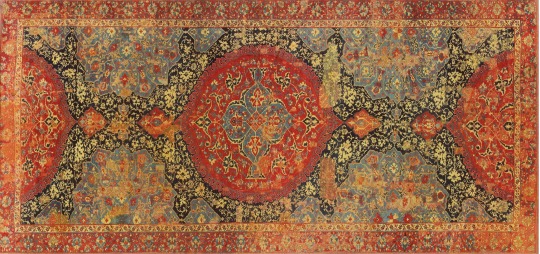

A large-medallion Ushak from the early 1500s has travelled between the Near East, Europe and America over the centuries. In HALI 205, Autumn 2020, Ted Mast places this exceptional carpet in context and uncovers its history.
Above: The carpet as it appeared in the 1932 Benguiat sale, unchanged when exhibited in 2006.
Below : Large-medallion Ushak carpet (after restoration in 2010) circa 1500–1510. (9′ 8″ x 20′ 11″).
Carpets currently called large-medallion Ushaks are unique—their basic design has been woven almost continuously for over five centuries. Probably the most identifiable of all rugs and carpets, they were originally produced in and around Uşak, a large town in western Anatolia known for its extensive rug production since the dawn of the Ottoman Empire. Their popularity proved to be widespread and enduring. The genre includes a well-known category of 19th-century Bijars, faithful to the original large medallion design.

Above: Detail after restoration.
The earliest ‘first phase’ examples, now dated circa 1450–1525, are considered to be the purest and most desirable. They can be distinguished by their careful draughtsmanship, with graceful arabesques and minimal distortion. The colour palette is limited but effective, with either red or blue fields, typically with a lattice of vinery and leaves over the field.
The design has been around for so long that it is considered traditional, but when it first appeared it represented a radical departure from the aesthetics of the era. A closely related precursor is found in the Baba Nakkas pattern book used in the court studios of Mehmed II (r. 1444–46, then 1451–81), but versions had been used earlier in leather bookbinding, metalwork and other media. The essential elements consist of a central medallion with semi-foliate pendants at either end. A few early examples have ovoid medallions, a seeming carry-over from bookbinding design, but there are equally old examples with round medallions; the preponderance of the latter suggests this was the preferred version.
Ushaks of any age short of new were in high demand throughout America’s ‘Gilded Age’ between the late 19th century and the mid-1920s. Dealers and auction houses in the US clamoured to supply the well-housed gentry in the eastern states from Boston to Miami. The Turkish émigré carpet dealer Vitall ‘the Pasha’ Benguiat (1859–1937) partnered with the Art Sales Corporation, a subsidiary of the American Art Association and precursor to Sotheby’s. The Association funded his scouring of Europe and the Near East to find important carpets and textiles to be sold at auction, and provided him a studio above its New York salesroom. But his extravagant lifestyle and a waning market took their toll, and by 1927 he owed the AAA a half million dollars. Cortlandt Field Bishop, co-owner of the AAA, demanded payment via immediate liquidation. After postponements, the first and most important liquidation sale was held on 23 April 1932, followed by another in 1935. Prices were fractions of what they had been ten years earlier, and it was said that losing his prized collection irreparably broke the Pasha’s spirit. He was rarely seen in the trade thereafter.
The Great Depression notwithstanding, tastes had changed. The proportions of large-medallion Ushaks were now seen as awkward, their designs were considered grandiose, and they were soon regarded as curios or relics, not as components of modern interiors. Nor was there much collector interest. During the second half of the 20th century, arguably a high point of rug studies and collecting, they were shunned to the point of wilful ignorance. It hardly mattered whether they were early or late, they were all seen as export-orientated, formulaic and devoid of personal expression. What’s more, for most collectors they were too large to display or store; typically heavily worn, damaged and dirty, they were not thought worth restoring.
A few years ago, the present owner yielded stewardship and entrusted it to Antique Textile Conservation (ATC) in Izmir, Turkey, for a comprehensive cleaning and restoration operation. It took over two years to complete and exceeded all expectations. The Ushak did not now look like a new carpet, but rather a 500-year-old carpet in near-mint condition. By coincidence, shortly after completion the owner was contacted by Michael Franses, who was conducting research in the Bardini Museum, Florence; he had discovered a photograph of this very carpet when it was evidently in the possession of the museum’s founder. Stefano Bardini (1836–1922) was an internationally known art dealer, painter and restorer whose focus was the Renaissance. He was known to have restored or repaired an array of objects, from paintings and furniture to architecture, including the deconsecrated church that is now the Bardini Museum.
Notably, in the photograph the carpet is unrepaired, making it likely that Bardini tried his hand at carpet repair and realised it was more difficult than he had imagined. Further research might tell when ownership passed to Benguiat, possibly in Bardini’s de facto ‘going out of business’ sale of 1918 in New York. Bardini and Benguiat would have been astounded by ATC’s uncanny abilities, and would surely have agreed that this restoration is a good thing for art history—to have a significant piece now museum-ready. Fortuitously Michael Franses and Alberto Boralevi have been researching this carpet, in preparation, it is rumoured, for a forthcoming exhibition at the Bardini in 2022. If so the event will undoubtedly include this carpet, now looking as it probably did when Copernicus proposed that the earth revolves around the sun.
HALI
18 notes
·
View notes
Text
Audi Specialized Collision Repair & Maintenance Services | Car Geeks Collision
At Car Geeks Collision, we pride ourselves on providing meticulous care for your Audi during repairs. As Miami's only Audi Specialized Repair Shop, we understand the unique needs of Audi vehicles and are dedicated to delivering top-notch service.

Expert Technicians and State-of-the-Art Technology
Our experienced technicians are trained in Audi repair and use state-of-the-art tools and technology to restore your vehicle to its factory splendor. Whether you need basic maintenance services like oil changes, brake pads, and rotors, or more complex tasks such as transmission service, engine work, or convertible rooftop repairs, Car Geeks Collision is equipped to handle it all. Our costs are significantly lower than what the dealer’s service department charges for the same services, making us a cost-effective alternative without compromising quality.

Transforming Your Audi with Precision and Care
At Car Geeks Collision, we take immense pride in the stunning results of our Audi auto body and collision repairs. Our "Before & After" showcase highlights the remarkable transformations we achieve, demonstrating our commitment to excellence. We use Audi-specific repair techniques and materials to ensure your vehicle looks and performs like new.

Miami's Only Audi Specialized Repair Shop
As Miami's exclusive Audi Specialized Repair Shop, Car Geeks Collision offers unparalleled expertise and service. We are one of the select few nationwide collision partners of the Audi Specialized program, meaning we uphold the same dedication to quality as Audi itself. When you choose Car Geeks Collision, you can trust that your vehicle is in the hands of professionals who prioritize precision and care.

Comprehensive Audi Repair and Maintenance Services
Our range of Audi repair and maintenance services includes:
Audi Collision Repair: Our skilled technicians are experts in Audi collision repair, ensuring your vehicle is restored to its original condition.
Audi Maintenance Services: Regular maintenance is crucial for the longevity of your Audi. We offer comprehensive maintenance services, from oil changes to brake inspections, to keep your vehicle running smoothly.

At Car Geeks Collision, your Audi is in expert hands. Trust us for all your Audi specialized collision repair and maintenance services, and experience the difference in quality and care. Contact us today to schedule an appointment and see why we are Miami's premier Audi repair shop.
0 notes
Link
Check out this listing I just added to my Poshmark closet: VHTF: new UNIF 🜸 Take Me To Your Dealer Muscle Tee 🜸 Pastel Tie Dye Weed Alien.
0 notes
Text
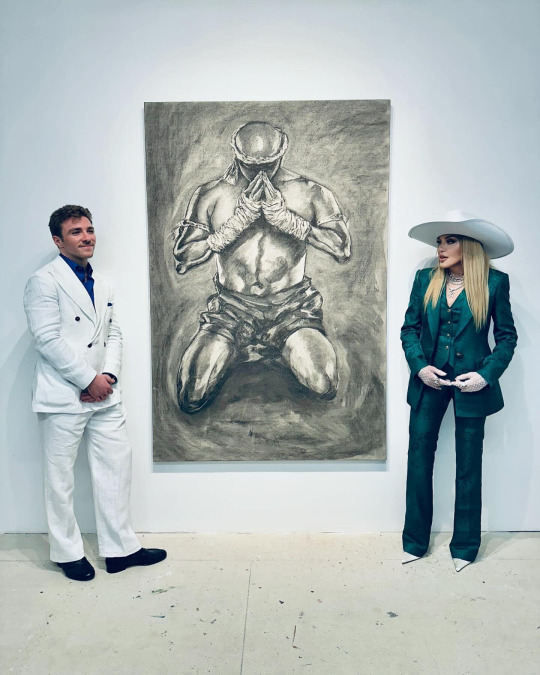
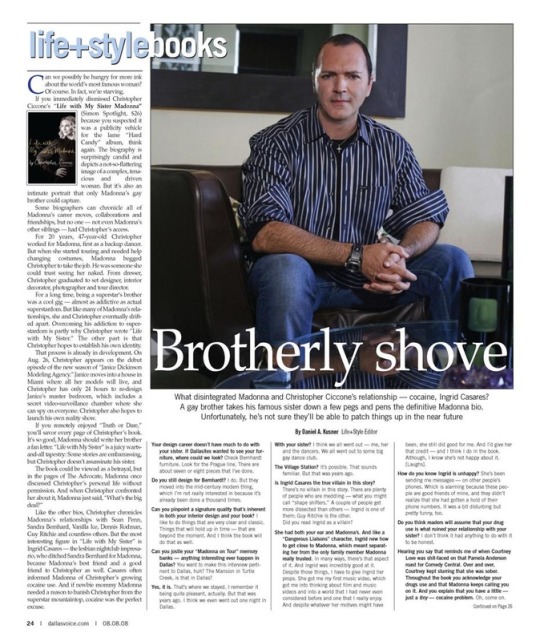
Painter Rocco Ritchie, Son of Madonna, Takes a Bow with Miami Pop-Up
Madonna is dominating the Miami headlines this week, with a run of blockbuster concerts.
(After the first two sold out, a third was added for tonight.)
However, the renowned icon’s first son, Rocco Ritchie, is also making waves in the Magic City right now.
That’s because Ritchie, a talented painter, is prepping a two-day pop-up exhibition.
Titled “Pack a Punch,” it will features new paintings and be on view Wednesday and Thursday, April 10 and 11, at 30 NE 40 Street in Miami’s Design District.
(Its organizer, dealer Jessica Draper, said walk-ins are welcome on Thursday; otherwise, viewings are only by appointment.)
Born in Los Angeles in 2000, Ritchie studied at Central Saint Martins and the Royal Drawing School in London, where he currently lives and works.
In his new works, Ritchie, who cites Lucian Freud and Francis Bacon as major sources of inspiration, is continuing his exploration of the human figure.
This presentation follows “Lovers and Enemies,” a solo show of Ritchie’s work in London last fall, where he showed portraits of his friends and family.
That one was curated by David Dawson, formerly Freud’s studio manager.
Ritchie’s parents (his father is film director Guy Ritchie) have been enthusiastic supporters of his painting practice, and his work is in the collections of fashion designers Stella McCartney and Donatella Versace and dealer Lorcan O’Neill, among others.
Artnet caught up with Ritchie on the eve of his opening to ask about his training, his inspirations, and his early years operating under a pseudonym.
When and why did you first pick up a paintbrush?
I’ve been painting since I was a small kid. It is something that always caught my attention and gave me a place to escape.

Did you have formal training?
I went to Central Saint Martins, but I developed my draftsmanship at the Royal Drawing School in London. I studied there for a few years.
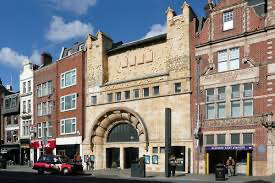
Your paintings are figurative, bold, and almost expressionist, with an intriguing palette. Who are some of your biggest influences?
My influences have changed over the course of time, and what is happening in my life informs which artists I am looking at.
Recently I’ve been focusing on British painters over the past 100 years or so, such as Bacon, Freud, Auerbach, and David Hockney.
For this show, I was particularly inspired by Frank Auerbach’s show at the Courtauld; the black and white charcoal works on paper.
Can you tell us about the pseudonym, “Rhed,” that you went by initially?
Rhed was something I came up with to go under the radar in the first few years of making work.
It doesn’t hold much deep meaning behind it, I just liked the way it sounded.
I tried to go along with it for as long as I could, but word eventually got out.
Were you wanting to stay anonymous and/or were you unhappy about being identified?
I’m proud of who I am and where I’ve come from, but I know people would have judged me aggressively in my early stages if I came out with my name.
I wanted to develop technically before showing under my name.
Do you work with a particular gallery or someone who handles the sales of your work?
As of now I am working with [art dealer] Jessica Draper. I’ve worked with galleries in the past, I’m just waiting to find the right one.

Who are some of your favorite artists whether historical or contemporary?
My favorite artists vary from Leonardo da Vinci, to Rembrandt, to Paula Rego.
Contemporary wise, I really like the work of Joseph Yaeger and Lens Geerk.
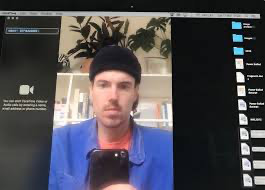
“Rocco Ritchie: Pack a Punch” is on view at 30 NE 40 Street in Miami on Wednesday and Thursday.

0 notes
Text
Gallerist Helly Nahmad Arrested For Suspected Gambling Related Money Laundering
The well known international art dealer Helly Nahmad’s New York gallery was raided by the FBI on Tuesday morning for suspected illegal gambling and money laundering breaches . The gallery located at the Carlyle Hotel on Madison Ave was thoroughly searched and computers were removed by the federal agency. Forbes stated that it was part of a “sweep of illegal gambling rings operated by Russian organised crime.” The New York Times have also reported “Helly Nahmad has been indicted for his role operating and financing high-stakes poker games involving Wall Street financiers, Hollywood celebrities and professional athletes.”
The actions taken on 16 April were part of a wider probe into Russian organised crime in the United States. Nahmad has been named for his involvement with a Bronx plumbing company used to launder profits from suspected gambling. The U.S. Attorney for the Southern District of New York issued statements alleging that one enterprise in this scheme laundered tens of millions of dollars through Cyprus companies and bank accounts. In NY, a 32-year-old JPMorgan Chase branch manager is alleged to have been involved in transactions in order to avoid bank reporting requirements. The Cyprus’ banking system has been under scrutiny as a haven for Russian organised crime for years. Last month a $13 billion bailout of its economy by the EU and IMF devalued the currency by 40%.
It is thought that the funds were placed into real estate and hedge fund investment. Mr. Nahmad, according to the indictment, also wired money $500,000 and $850,000 from his father’s bank account in Switzerland to a bank account in America to help fund the gambling operation. The government is seeking the forfeiture of four high-end properties, including an apartment at Trump Tower on Fifth Avenue and two Miami estates, in connection with the case. In a separate case, Mr. Nahmad has been accused of defrauding a client by overpricing a $50k painting by selling it for an overvalued $300,000.
The roots of the Nahmad family are in Aleppo, Syria, where Sephardic Jewish banker Hillel Nahmad lived until just after the second world war. Following anti-Jewish violence in 1947, he moved to Beirut, Lebanon and when the situation there became difficult, he took his three sons, Joseph (Giuseppe), Ezra and David, to Milan in the early 1960s. As teenagers in the 1960s, they began to deal in art. Ezra and David skipped school to trade on the Italian stock market. At a Juan Gris exhibition in Rome organised by cubist dealer Daniel-Henry Kahnweiler, Ezra and David bought two works – the only pieces sold. Kahnweiler befriended them, selling them works by Picasso, Braque, Gris. With the emergence of the Red Brigades terror group in the 1970s, Milan was perceived as too dangerous, and the family moved again. Joseph and Ezra headed for Monaco, and David to New York. New York’s Helly Nahmad Gallery, on Madison Avenue, is a separate company run by David’s son, who took over his father’s earlier Davlyn Gallery. David Nahmad was the 1996 Backgammon World Champion, and is known for betting large amounts of money on the game. This latest case is part of a Stateside probe into organised crime.
0 notes
Text
Art Crime Pays: Trump Pardons Helly Nahmad, the Art World’s Cartoon Villain
The pardons favored Trump cronies, allies, and business associates — in the manner of a bouncer fingering VIPs from behind a tatty velvet rope at Le Baron during Art Basel Miami Beach
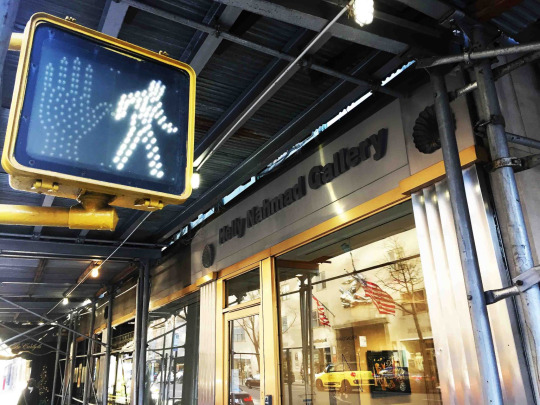
Helly Nahmad Walk
It was April 30, 2014, and Hillel “Helly” Nahmad was doing his best courtroom grovel.
“Your honor, I am ashamed,” the then 35-year-old art dealer told U.S. District Court Judge Jesse M. Furman inside Manhattan’s Thurgood Marshall Courthouse. “My family is a private family and I have brought dishonor to it . . . No matter what your sentence today, I will never forgive myself. Others who love me may forgive, but I will not.”
The scion of the famously secretive Nahmad clan — a three-billion-dollar art-dealing empire heavily leveraged with Picassos and Renoirs and with economic interests across the U.S., Europe, and the Middle East — Nahmad was being tried as part of a wide-ranging, 34-defendant racketeering and money-laundering investigation. The case was brought by the Violent and Organized Crime Unit of the U.S. Attorney’s Office for the Southern District of New York, led at the time by Preet Bharara, who was fired by President Donald Trump early in 2017.
The charges against Nahmad — who runs a glitzy secondary-market gallery located on the first floor of the Carlyle Hotel — were weighty enough to galvanize the Feds and sufficiently boldface to inspire an Aaron Sorkin film, the Jessica Chastain vehicle Molly’s Game. According to The New York Times, Nahmad was charged with captaining a $100 million gambling ring that included professional athletes, actors Tobey Maguire and Leonardo DiCaprio, and several organized crime figures, among them Russian oligarch and Trump acquaintance Alimzhan Tokhtakhounov (the Uzbek gangster is still at large in the vast criminal underworld that is the Russian Federation). Additionally, Nahmad was accused of bilking an unnamed female client described as being in “dire financial circumstances” out of more than $100,000 in an otherwise “routine” art sale.
Facing as many as 100 years in prison, Nahmad was found guilty and sentenced, incredibly, to just a year and a day (he effectively dodged racketeering, money laundering, and conspiracy charges, and was indicted on a single gambling count). He was also ordered to pay a $30,000 fine, plus forfeit $6.4 million and his interest in Raoul Dufy’s 1937 painting Carnaval à Nice, which was employed in yet another allegedly fraudulent transaction.
Before the trial ended, Nahmad delivered himself of a remarkable allocution. Unlike the statement defendants regularly convey to judges to accept responsibility, humanize themselves, and mitigate sentences, Nahmad’s expression of remorse instead mimicked comic-strip beggary: his plea for leniency described how, after his April 2013 arrest, “Nahmad was a blubbery mess who collapsed into his sister’s arms.” Writing for the now defunct publication DNA Info, reporter James Fanelli also reported on Nahmad’s offer to chaperone underprivileged youth on visits to the Metropolitan Museum of Art in lieu of prison time: “I do not have a great education in other subjects, but I really do know a lot about art and I think I could really reach young people in a good way and hopefully introduce them to a world they might not otherwise visit.”
The court summarily dismissed such expressions of contrition as insincere. According to Judge Furman: “Mr. Nahmad’s view of the world, at least when he thinks that no one is watching . . . [is] that he can take advantage of the situation. To allow him to use his family’s money to buy his way out of this would sow contempt for the law.”
Fast forward to January 20, 2021. As part of his final febrile hours inside the White House, Donald Trump — the Biff Tannen of rich boy privilege — issued pardons to 73 convicts, including Nahmad, the Snidley Whiplash of the art world. An official White House communication described the 41-year-old art perp as having led “an exemplary life” since his conviction. (Requests for comment on the pardon sent to Nahmad’s gallery went unanswered.)
According to Kenneth P. Vogel of The New York Times, only 25 of Donald Trump’s almost 240 pardons and commutations came through the process the Justice Department normally uses to identify and vet worthy petitions of clemency. The rest favored an ad hoc process that privileged Trump cronies, allies, and business associates — in the manner of a bouncer fingering VIPs from behind a tatty velvet rope at Le Baron during Art Basel Miami Beach.
At first, second, and third glance, the Nahmad pardon suggests a tangle of plutocratic quids, pros, and quos. Nahmad owns the entire 51st floor of Manhattan’s Trump Tower, for which he paid $21 million, in 2016. His lawyer, Benjamin Brafman — who previously defended Harvey Weinstein and Martin Shkreli — also helped obtain pardons for two more noteworthy clients: conspiracy theorist and campaign-finance fraudster Dinesh D’Souza and disgraced former Illinois Governor Rod Blagojevich. Another longtime Brafman client who was recently pardoned: witness-tamperer and tax cheat Charles Kushner, father of Donald Trump’s ex–senior adviser and son-in-law. The relationship patterns are as ugly as a MAGA Christmas sweater. (If other presidents, such as Bill Clinton and Ronald Reagan, issued controversial pardons — the former pardoned fugitive banker Mark Rich, the latter Yankees owner George Steinbrenner — Trump’s forgiveness stands out for the close proximity of folks he has let off the hook, including former campaign advisers, staffers, and in-laws.)
In a Trump-free universe, pardons and commutations are overseen by federal prosecutors and the U.S. Attorney General. Typically, they are also reviewed by the judges involved in the original sentencing. Applicants are evaluated on their post-conviction conduct, the seriousness of their crimes, whether they are remorseful, and, ultimately, personal recommendations. Though no recommendations for Nahmad’s pardon are yet forthcoming, Judge Furman characterized his 2014 letters of support as coming from art-market folks who “had some reason to curry favor” with the Nahmads. One letter came from Pace Gallery honcho Marc Glimcher. He told the court that Nahmad “is very simply the most honest and trustworthy person we have the privilege to work with.”
“Gambling has always been a part of my life,” Nahmad told Judge Furman before being convicted, “I watched my father and his friends play games . . . for high stakes. It was a part of his life the way the art business was. It was almost an addiction. It crossed the line into my being part of illegal gambling. I knew we were no longer just betting and I should have stopped. I didn’t and I have only myself to blame.”
Besides throwing his own father under the bus as, ahem, ethically challenged — in 2016 the Panama Papers connected David Nahmad to ownership of a Nazi-looted painting, Amedeo Modigliani’s Seated Man With a Cane (1918) — Nahmad fils conveniently left out his own larcenous worldview. In 2014, a wiretapped phone conversation recorded Helly as saying that wealth can be created by those who “circumvent the system” and “cheat and lie.” Here’s a modest proposal for those sick of having the art trade routinely compared to the shadowy worlds of drug cartels and gun trafficking. Remember Nahmad’s words and who uttered them, reject business as usual, and trash the idea that art crime pays. ❖
0 notes
Text
Jeff Bezos Lauren Sanchez Fuel Rumors of Major Art Purchase After Being Spotted at Art Basel Miami
Jeff Bezos, Lauren Sanchez Fuel Rumors of Major Art Purchase After Being Spotted at Art Basel Miami
https://www.entrepreneur.com/business-news/jeff-bezos-lauren-sanchez-spotted-with-big-art-dealer-in/466771
The pair hosted the FIRST Inspire Gala on Thursday.
via Entrepreneur: Latest Articles https://www.entrepreneur.com/latest
December 11, 2023 at 01:38PM
0 notes
Text
5 Signs YOU DON'T NEED SEO To Rank On Google

For anyone running a business, it feels like you never stop having new and important marketing strategies, practices, and tactics you need to be doing.
One one hand, you know you can't throw money at every decent-sounding strategy that comes your way... but you're also very aware that if you miss the next big thing, you're giving up a HUGE advantage to every competitor waiting to take your customers.
For many, search engine optimization (SEO) falls into this category... and here are 5 reasons why .
SEO is costly and you never really know where your money is going
Getting a web page to rank high for valuable keywords is one of those things that's part art, science, and intuition.
Even though search engine optimizers have a rough plan of what they're going to do, they work in a sort of touch-and-go manner (that's the art / intuition part) so it's difficult to tell someone exactly what the specific plan is.
Add to that, it's easy to take someone's plan and do it yourself or hire someone in-house to do it (another reason SEO consultants and agencies don't share too much about specific tactics).
Ranking on the top of Google for a keyword that people use to buy the things you sell can literally make you an overnight success... so that puts SEO people and SEO companies with these "superpowers" in high demand and at times, excessively expensive.
This isn't to say that there isn't a ton of work that goes into good SEO... and I'm definitely not saying it's not worth it if you can double, triple, or even 10X your results (because it's not uncommon to grow your sales 10X once your SEO finally kicks in), because it is.
What it means is that as with anything worthwhile and in high demand, you're going to pay a little more if you want it.
SEO requires time and consistency (it is not set-it-and-forget-it)
SEO is long-term.
It takes months (and sometimes even years for the most competitive search terms) to get a #1 ranking on Google.
If you're strictly looking for a quick turnaround and want to start ranking tomorrow, there are better ways to do this (like PPC).
That said, be careful to avoid confusing the need for immediate results with basic lizard-brain impatience because the latter can cause you to miss out and lose big on significant opportunities.
Also, SEO isn't set-it-and-forget-it and that's not a shot at the efficiency of SEO or the person executing your SEO.
Instead, it's more to do with the everchanging environment, new technologies, and how people adapt to these and all the other changes.
Think of how voice search on Siri / Alexa / etc. changed things up.
If I wanted to buy a new car, I might type the following search in Google: new car dealers in Miami
If I'm using Siri or Alexa, I'd probably "ask": Where can I buy a new car near me?
As a business, you can open your business up to lots of new customers just by doing some research and staying on top of all the ways potential customers are searching for the things you provide.
SEO results take time to manifest
SEO is like a sport.
For an athlete to get to the top and become #1, they need to execute the strategic, time-consuming, and sometimes difficult work.
You can fast-forward the results by bringing in someone who already knows what they're doing... though they still need time to sort things out, figure out how to work within the team / business structure, and adapt it to their work.
Anyone who promises quick gains, is likely doing something that'll get you in trouble (and ultimately, banned) so when it comes to SEO, it's wise to remember the saying: Easy come. Easy go.
SEO practitioners are tight-lipped about their work (and love to badmouth each other; many times unfairly)
Like I said above, sometimes it's impossible (or unwise) to be completely transparent with an SEO action plan because much of it is touch-and-go and / or intuition.
Also, no one likes to spend hours on research, analysis, and planning just to have their work implemented by someone else and ultimately, leaving them out of the loop and unpaid.
Imagine writing a book, taking it to a potential publisher, and when you leave, they publish it themselves under their name and you receive no compensation or recognition for your work.
That's what happens every day in the SEO world and unethical consultants and SEO salespeople take advantage of that and start poking holes just to get the job / contract only to end up using the same tactics and charging more to do it.
A confident search engine optimizer doesn't need to badmouth another's specific execution without first understanding the full scope of what's going on (a lot of things start to make sense when you understand why people do the things they do; it's no different with SEO).
Generally speaking, the SEO industry has lots of scammers and few actually get the results they promise
Does this even require further explanation??
First, let's understand what SEO actually is.
SEO stands for / is the acronym for Search Engine Optimization (and sometimes, it's used to describe the person doing the work; Search Engine Optimizer).
Simply put, SEO is the practice / tactic / art / science / strategy of optimizing or tweaking a web page (or collection of web pages) to rank well for specific keywords with the intention of getting people to view said web page(s) when people search said keywords on search engines (like Google, Bing, DuckDuckGo, etc.). "SEO" is also used as a noun to talk about a person that does search engine optimization.
Essentially, an SEO's job is to "convince" a search engine that it is the absolute best resource for a particular search phrase / keyword.
This convincing is done, in large part, by demonstrating popularity and authority... SEO is a great big popularity contest (it's like being a teenager and being back at school).
Basically, the more times people visit your pages, talk about your pages, link to your pages, share your pages, etc., the more popular (and the more authority your brand is perceived to have).
You're probably thinking that it's easy to fake these things and you'd be right... if it was 2005.
Today, search engines have extremely sophisticated systems (algorithms) in place to catch "black hats", fakers, and search engine spammers.
Believe me, no matter how slick you think you or your systems are, Google will catch on.
Because Google's entire business model is based on providing the best search experience, they spend a ridiculous amount of money protecting the integrity of ALL their search results which means everyone eventually gets caught (and the smarter $$$ invests in long-terms big results over immediate but short-lived "okay" results).
An important stat you should know about SEO
According to Hubspot (they're kind of a big deal), 81% of consumers say they do online research before buying anything online and many of them start the process on a search engine like Google.
a., I actually suspect that number to be much higher than 81% by the way because these studies are usually a few years behind
b., We're hardly ever more than arm's reach away from our phones which means we're always ready to "Google" something
c., Because of the above, people now research things online before making offline purchases too!
d., Google gets over 3.5 billion (yes, that's billion with a B) every day; as I'm writing this around noon time, Google already has well over 4 billion searches today — check out this cool page with Google search stats
As the title states, SEO isn't for everyone.
Onto the 5 signs you don't need SEO (and you'll still be fine)...
1. You don't have a website
Yes, most businesses will benefit greatly from having a decent website however there are many that never had one and do fine without one.
While one could argue that having a website (and doing SEO) can grow the business, there are plenty of people out there that are getting more than enough business, aren't interested in getting any more customers, are happy where they're at, and like being small enough they don't need to go after customers (more about that below).
If this is you, you don't need SEO.
2. Your business is too small for SEO
Sometimes a business' margins aren't big enough to justify the cost of building and maintaining a website (though there are affordable options; see here) and then getting search traffic to the website they just invested in (btw, it is possible to do SEO even when you don't have a website; see here).
On average, a basic customized website will cost anywhere from $600-$2,500 (5X more if you want to sell products through your own e-commerce shopping cart) plus monthly hosting and email ($5-$45/month on average; here's the hosting option I use and recommend if budget is an issue).
Also on average, SEO will cost you $800-$10,000 per month (the low end is usually okay for low competition industries where it's okay to "work slower").
If your outlook isn't making generating at least 3X the costs I shared above, then you definitely don't need SEO (at least not traditional SEO).
For you, I recommend getting good at one social media platform (like Instagram, Facebook, TikTok, Pinterest, YouTube, etc.) and posting stuff that' important to people buying what you sell and that ties in directly to your product / service.
Additionally, I recommend creating a Google My Business (GMB) page / profile and filling it out as completely as possible and regularly adding posts to your GMB page.
This will help you to rank on Google Maps for local searches without having to invest in traditional SEO.
3. You're getting TOO MUCH traffic already
I meet people all the time who already have more traffic than they can handle (or convert) but they're afraid of missing out (FOMO) on the benefits of SEO.
If this is you, you don't need SEO.
Instead, put your efforts on improving your conversions and wow'ing your customers with outstanding world-class customer service.
Because SEO keywords is a moving target, you're really never in danger of "missing out".
The real reason to get started early is to get your top search engine rankings sooner but if you're not even converting what you've got (or worse, you're providing "just average" service), then you're just compounding and exploiting the things you need to fix.
4. You're already ranking on Google
Many times I'll do an analysis for a business owner only to find Google already sees their brand as an authority and is already ranking them on the top of many search results.
If this is you, you don't need SEO however you'd probably benefit from doing a little research to see what's working really well and make sure you continue to do more of that.
I'd also see if there are any keywords you can add to your website's content for an easy and inexpensive traffic boost.
5. You're not ready to commit
I know it's cliché, but SEO is a marathon.
If you're not ready (or able) to commit, SEO isn't for you.
Lack of patience will kill the most promising SEO campaign and oddly enough, people will typically want to pull the plug right before things are about to start happening.
Investing month over month without visible results is difficult to see and even more difficult to "sell" to bosses and partners who don't understand SEO.
Sometimes money is an issue... this is where you need to think like the successful CEO.
They don't plan on immediate returns because they know the biggest and best returns come from "slow growth" and therefore always plan on not seeing any returns for a significant length of time (this is how they manage expectations and seemingly always get incredible results).
Sidenote: Jeff Bezos' battled investors on a daily basis who couldn't stomach severe losses during Amazon's early years. Jeff committed to the marathon and shifted his investors' mindset from sprint mode to marathon mode. Until you can do the same, you don't need SEO.
What if you DO need SEO?
If after reading all the above you find that you do need SEO, you can either click here (for an SEO I wholeheartedly recommend) or read my post on how to make sure you're getting the right SEO help.
Read the full article
0 notes
Text
5 Ways to Find The Right Luxury Car Dealers Miami
Miami is home to some of the most luxurious car dealers in the country. If you are in the market for a high-end vehicle, you should make sure you find the right dealer to do business with. Here are five tips to help you find Luxury Car Dealership Miami that will meet your needs and expectations.

1. Do your research - read online reviews and compare prices
Various Luxury Car Dealers Miami offers the opportunity to purchase a great selection of luxury cars. To ensure you get the best deal possible, it is important to do your research by reading relevant online reviews and comparing prices. Luxury cars may come with hefty price tags, so there is nothing wrong in setting aside time to make sure you are getting value for money. By thoroughly researching Luxury Car Dealers Miami, you can narrow down your options and find the perfect car for you at a fair price.
2. Find a dealer that specializes in the type of car you are interested in
When looking for a Luxury Car Dealer in Miami, it is important to make sure that you find one that specializes in the type of car you want. Luxury car dealerships often offer customizations and specific care options, such as detailed cleaning or maintenance programs. They also typically stock extensive inventories of high-end luxury cars and feature expert sales staff who know the ins and outs of the cars they are selling.
3.Ask for referrals from friends or family who have recently purchased a luxury car
Luxury cars are a significant investment to make, and it is important that you find the right dealership to work with. A great way to get started is by asking your friends or family who have recently purchased luxury cars in Miami. They can provide valuable feedback on their experiences with different car dealership in Miami, whether they had great customer service or were disappointed by the price. Asking for referrals from those close to you can help you find a good Luxury Car Dealer in Miami before making any decisions.
4. Negotiate the price - don't be afraid to haggle!
Luxury car dealers in Miami are no strangers to the art of haggling. In fact, it is often expected! Whether you are buying a new car or getting a trade-in deal, don’t be afraid to ask for what you want. Luxury dealerships in Miami understand that customers want the fairest deals possible, so don’t let an initial asking price intimidate you. Do your research so you know exactly what terms you are comfortable with and don’t forget to use negotiation strategies like making a reasonable counteroffer or expressing your desire to leave unless you get your desired outcome. Negotiating at luxury car dealers in Miami can often save you money and hassle if done right.
You Can Also Check - Out :
auto car dealer in miami
pre owned cars miami
Conclusion
Purchasing a luxury car is a big decision, but if you do your research and take the time to find the right car dealer miami, you can ensure that you end up with the perfect car for you. Be sure to ask for referrals, compare prices, and schedule a test drive before making your final decision. And don't forget to negotiate - haggling can go a long way in getting the price down on your dream car.
0 notes
Text
See This Report about Auto Upholstery Columbus OH
Think of your vehicle with a lavish quality leather inner parts. It's like a excellent vacation opportunity! Also if you're in the market for a great bargain, always keep an eye out for such things as the Ferrari and FXX. Some of the very most well-known of these deluxe cars are additionally helped make of synthetic natural leather, but we've discovered that the greatest of them merely last for thus long, and are no much longer required. We decided to provide you the most recent on FXX Luxury Luxury Leather.
Possibly you’ve preferred one but thought it was truly expensive at the dealership. But now i´ll have what is left. I possess a set of G2 with a reddish one that got repainted all over because i purchased one in my garage but now i mayn't discover it. Im not presuming but i was questioning if you're going to do some art work merely to help make sure you're not leaving behind any of the stuff.

Possibly More Details didn’t understand that you could quickly upgrade your towel chair on the car you have now. I are going to take these off your hands and show you how.“ # # # # **************I ask forgiveness for my negative taste’t when you took your bag. ************** The automobile was already going up, if a little bit a lot more crowded than only the normal, and after that you went outside, and you took back on the seat and watched the groups.
Whatever your goal, Pro-Trim of Ohio and Katzkin may deliver it, adding luxurious, comfort, and style to your auto at an budget friendly cost. With a huge and relaxed ambience and a special concept, Katzkin always keeps you moving, and the Katzkin SportsCenter SportsCenter, with its distinguishing appearance, stand up to help make your time a whole lot easier than any type of other.
Pro-Trim has been offering pro installment as an Authorized Katzkin Dealer since 2004. We focus in Authorized Kinematics and Performance Flooring, and have been giving OEM floor along with a special purpose and brand-new building quality component. All initial components have been assessed and used! We are self-assured that most of the OEM and Authorized Kinematics have been evaluated before and we are certain to match their premium along with the ideal! Please contact Katzkin Hardware for specialized help.
Our installers are the greatest in the Miami Valley and Dayton place when it comes to automotive leather. For the rate, they give an outstanding leather-made item that will definitely fit practically any sort of problem. The consumer bottom is developing rapidly therefore check out the hyperlinks under for the many up to date info about brand new products and products. Caramel Leather Evaluations: 5 Easy, Inexpensive, and Good News, 4 Great and Necessary 1 – We as if what they've received, we love what they've produced.
Their combined years of encounter imply you may relax assured that your custom leather set will certainly be took care of correctly and set up with the highest amount of top quality and focus to information. We've placed a whole lot of initiative right into our construction and we presume your aid will allow us to comply with our goals. It is additionally the ideal starting factor for your next job to get started.
Katzkin delivers over 3,000 interiors, accessible in 120 different colors and components, giving practically unlimited design selections. Individualize, customize, tailor and individualize your space or embellishing through purchasing custom concept and incorporating or subtracting style. It's that straightforward, no matter what your decorating demands are! Style to the appeal of your room or decorating, at that point individualize along with your personal layout. You can easily even produce a singular level or level for each layout.
Our workers are going to evaluate your vehicle before getting to make certain effective fit and get in touch with along with you on any function you wish to include in purchase to provide optimal total satisfaction with your leather vehicle furniture. When purchasing a brand new automobile along with our Leather Knee Brake Replacement Service our customer company staff can assist you along with all the required particular required to be able to switch out your feet along with an in-house-made repair work specialist.
Nonetheless, if you would as if to start appearing at achievable configurations now, pick the red switch to be taken to Katzkin's website and observe what possibilities are offered for your motor vehicle. When it comes to safety, there's one achievable response: the additional folks using Lexus on a daily manner, the even more positive they'll be in their safety. If you're in a rush-hour, high-speed city vehicle urban area, what other alternative might you choose?
We want you to Enjoy your Travel! When I acquire in to a automobile accident, I hear a whole lot regarding the trouble with driving and I prefer to talk concerning it because that's really common for me, but when I'm in a lot-of-this-crazy situation I find myself going back to some of my outdated concerns of steering and that has truly helped.". Loving your ride is an vital goal every opportunity you move your automobile.
#katzkin installer columbus#leather seat installer columbus#leather seats columbus#custom leather seats columbus
0 notes
Text
Porsche Specialized Collision Repair & Maintenance Services | Car Geeks Collision
At Car Geeks Collision, we pride ourselves on meticulous care of your Porsche during repairs. As Miami's only Porsche-specialized repair shop, we ensure that your luxury vehicle receives the highest quality of service. Our experienced technicians, trained in Porsche repair, use state-of-the-art tools and technology to restore your vehicle to its factory splendor.

Comprehensive Porsche Repair and Maintenance
Our team at Car Geeks Collision understands the unique needs of Porsche vehicles. We offer a comprehensive range of services, from routine maintenance to complex repairs. Whether you need a simple oil change or extensive engine work, our Porsche repair shop is equipped to handle it all.

No job is too complex for Car Geeks Collision, and our costs are significantly lower than those of dealer service departments, without compromising on quality.

Transforming Porsche with Precision & Care
Witness the remarkable transformations that unfold at Car Geeks Collision through our exclusive "Before & After" showcase. We take immense pride in showcasing the stunning results of our Porsche auto body and collision repairs. Our dedication to precision and care ensures that every Porsche we work on leaves our shop looking and performing like new.

The Car Geeks Collision Difference
As one of the select few nationwide collision partners of the Porsche Specialized program, Car Geeks Collision provides the same dedication to quality as Porsche itself. Our Porsche auto body shop is recognized for its excellence in auto body repairs, making us the top choice for Porsche owners in Florida.

Contact Us
Experience the difference at Car Geeks Collision. For top-tier Porsche repair and maintenance services, visit us today or contact our team to schedule an appointment. Trust your Porsche to the experts who care as much about your car as you do.

At Car Geeks Collision, we transform Porsche vehicles with precision and care. Discover why we are Miami’s only Porsche-specialized repair shop and a trusted partner nationwide.
0 notes